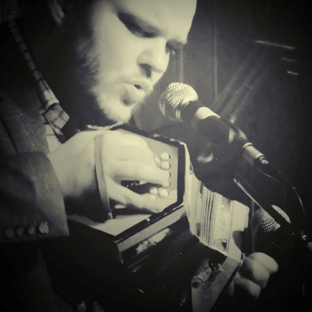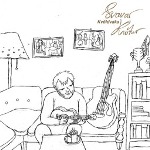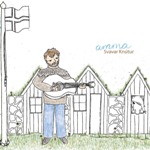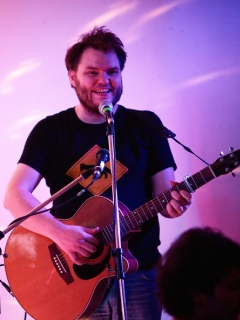As you can see in my list of personal best albums of 2011,[47] you see that one of my favorite is the beautiful album Amma by the Icelandic singer Svavar Knútur. It’s not often that a musician dares to record in such a pure, almost naked way. It made me curious what the story behind the album and this great singer is.
Growing Up North
‘I grew up in the North of Iceland in a fjord called Skagafjörður. My father was an inventor, fisherman and a farmer and my mother was a school teacher. The family was pretty poor and we lived on a farm in one of the coldest areas in Iceland. My parents were very interested in music and also in me and my brother's musical education, so there was an old Yamaha acoustic guitar in the home with all the wrong strings. And also, my parents spent all their savings in buying a "state of the art" home organ that I got to use to learn piano in the local music school where I went to school. I'm very grateful to them.’
That’s how Svavar starts his personal story, immediately going on telling about the music they listened to at home.
‘My dad loved Yes, Emerson, Lake and Palmer, Jeff wayne's war of the worlds, Elton John and only Abba's last album, the Visitors. Mom loved the early Beatles, however, she thought the last albums were to druggy. They both loved Cat Stevens. I think that's the only thing they agreed on in life. My favorite albums were my two Muppet albums. I had a very immature music taste when I was a kid. Probably due to my isolation. I only listened to whatever was on the radio and the few albums we had at home. And I never had friends that introduced me to anything new. Everything I discovered was always through some kind of accident and usually long after it went out of style. All in all though, I didn't have a very deep musical upbringing, as my father was pretty distant and didn't like to introduce me to the music. He told me to leave his albums alone and listen to my own stuff. Actually I never could identify with any subculture, because I couldn't bear the thought of having to conform to any fashion, to all those faux rebels, trying so hard to be anti-establishment, that they became an establishment of their own with all the same stupid rules as the superficial ideology they were rebelling against. I always had to do things my own way. It wasn't until my mid-twenties that I started kind of "keeping up" with the scenes and knowing the musical trends and then I discovered Nick Drake, Bonnie Prince Billy and Kris Kristofferson, and they just blew my mind. Simplicity, sincerity and just honest music.’
After this introduction about the role of music in his upbringing, he paints with words the way he experienced his childhood.
‘My teenage years were very lonely. My family lost the farm and moved around a lot and I didn't have many friends. I was bullied a lot, because I was never very good at sports, and I had also been sick as a child, so I was not a big athletic guy, plus I was very intellectual, preferring science fiction and poetry to football. Being a nerd in the countryside means you get bullied. I spent a couple of years looking after one of my grandmothers and I didn't really see my dad much for the rest of his life. I guess that left a mark on my soul, but I've used my music to get through that. A lot of my songs are songs of reconciliation and redemption from that experience. But I guess all this has taught me to really appreciate the love, family and good friends I have today.’
The Birth of the Musician
Calling his childhood not really a deep musical upbringing, it makes me even more curious how he developed into a musician.

‘It's funny about developing into a musician. Dad was very fun, but unreliable and a dreamer. I think mom resented that a bit. That resentment rubbed off on me a little, so after dad died, I spent a long time trying to reject the idea of making music and being a musician, living as an artist. I just wanted to be a "Real man" providing for a family and being strong and reliable.? But gradually, as I reached my thirties, I realized that I had to follow my dreams, the artist urge just became stronger and stronger. But I decided to do it in a way that I would never let my family down. So I do provide for my family with my art, I just work very hard and do a lot of different gigs too.’
‘I picked up the guitar at 14 or 15 and spent some time in the scouts, where everyone encourages you to play even if you suck.. I had nothing to lose anyway. I just loved the acoustic guitar and all its possibilities. I discovered the Ukulele in 2007, watching Jens Lekman playing it. Having been bullied all my childhood and teenage years, I could really relate to this fragile little thing that everyone treated as a joke guitar for clowns. I bought my first ukulele in London in December 2007 and played my first Ukulele song live on Icelandic TV in January 2008. I've also learned to play the piano, musical saw and Accordion. I love to play different instruments, and one of my favorite moments was when I played drums, harmonica and accordion with a dark folk band in 2008, all at the same time.’
After playing in the band Hraun, he recorded his first solo album in 2009 and the decision to follow his dreams resulted in the 'Kvöldvaka' album.
‘My first solo album, Kvöldvaka was my attempt to bring together the essential parts of a work that has been my focus for the past couple of years, "songs of misery and redemption". It tells the story of my return to Grace after the death of my father and the difficult years that came after that. I wanted to make simple, so it was almost completely recorded live with only minor overdubs. The songs had been coming for the last couple of years and some of them were actually songs I'd been playing with my old band Hraun. I just really wanted to make something by myself, as simply and elegantly as possible. I took that idea further with Amma (songs for my grandmother) where I only used one instrument for each song.’
Amma
It is his second album 'Amma - Songs for My Grandmother' that was issued last summer which I love so much. What’s the story behind this CD?


‘The Amma album is my tribute to the songs of the older generations, songs that my mother and grandmothers used to sing. There is actually only one original song on that album. The rest are songs that I really love and wanted to make more accessible to my, and younger generations. Because they were usually performed very old fashioned with screaming tenors and banged pianos. Turns out, the old people love the simplicity of my versions. Most songs on this album I've learned from my family and some I learned from my teacher at the singing academy. My grandma had cancer at the time and I wanted to give her something beautiful to show her I loved her, so I talked to my Label and they said "That's a wonderful idea". They agreed to wait with my next original songs album and focus on the grandmother songs instead. I love my label!’
Making traditional music accessible for several young and older generations, it makes me wonder if there still is interest in traditional music anyway on Iceland.
‘I think there is definitely still interest in singing traditional songs in Iceland, but it's fading, and Amma was an attempt to revive that tradition. I think it's working, there are more artists actually bringing up the old songs and people my age and younger are starting to learn the songs again. When I was a kid, that tradition was almost dying out, because of the ultra-modernization of Iceland. So I think the traditional music is definitely "endangered", in the way that we really have to bring it back. Traditional songs were sung while working on the farms and the sea and while working at night before sleep. Now, everyone works in offices and it's not considered cool to sing traditional songs while you file documents or sell cars. So it's harder to keep those songs alive and many will be forgotten. Also, it's not generally considered cool, in our youtube-iTunes-spotify infested society, to sing the old songs, but we hope to change that a bit. I do sing a lot to my daughter Emma, as do almost all Icelandic parents. One of our favorite lullabies is "sofðu unga ástin mín" (sleep my young love) that tells of the howling of the death deep glaciers and the terrible, sad and mournful nature of human existence. I'm not joking. I also just wrote her a new song, and I've been singing that one for her.’
Wanting to make the traditional music accessible for younger generations sounds great. How were the reactions of the album, did people indeed like it?
‘People have always been very positive and supportive, aside from maybe a couple of hipsters that I've learned to ignore. I play a lot of free shows for children and old folks, because they can't come to normal concerts in cafés and pubs in the night. They are really appreciative and positive and you know, kids are the most critical audiences. They don't let you get away with any half assed stuff.’
‘I think I've read maybe two negative reviews on my music, both by writers that confessed in their articles that they hate my kind of music because folk sucks. At first I felt hurt and vulnerable, and it does sting when somebody calls your music shit, but then I decided to focus on the positive stuff and also the constructive criticism, which is my favorite. I love it when somebody just criticizes the music fairly and points out things that I could do better. I want to learn and grow. People reacted really well to my Amma album and it actually grew my fan base a lot, because now a lot of older people and middle aged people are also listening to my music. I mean, I'm not a pop artist, but of course it matters that people enjoy what I'm doing. I like the fact that a wide age group of people are enjoying my music. That means it's not superficial and just for today. I like being able to give a concert and people actually come and pay entrance to hear me play. That means I can live off my art and that's amazing!’

‘I don't believe an artist should be in a bubble and not care about other people's reactions, but of course you always have to be doing things for yourself first and foremost. Other people enjoying your music is a great bonus and makes it all work out. That's what I love, when everything clicks.’
A new album is planned within a few months.
‘My new solo album has the working title "Ölduslóð" (Path of the waves). The theme is love. Old love, new love, true love, love of the family and friends and my daughters. Some love is difficult, some is easy, some is wonderful, and some is catastrophic, but I think all of the songs on the album are about love in one way or another. I know, love is such a cliché, but the best part about being a folkie is that you don't have to chase the "new thing" all the time, and you don't have to be avant-garde, you just have to be true to yourself. I've been working with a girl choir and I've been teaching them Ukulele. I'd really like to have them play and sing on the album, and even do one solo number, without me. I'm looking for a good producer to make the soundscape more complete, as I want to explore a little bit with this one. I love simple, but sometimes I just want to experiment. I think the lyrics are around 50/50 Icelandic and English. I like my international listeners to be able to understand some of my words, but I'm also proud of my language and I want people to hear it, so I want to sing some of the songs in Icelandic. Language also plays an important part in the emotional color of the songs. The other project I'm working on is an album where old people, children, handicapped people, mentally retarded people, prisoners and all kinds of different folks participate in the music. I'm still working on the songs, but the theme is not fitting in and being a freak in the world, but still finding your place.’
Music Is More Than Just Playing
Besides writing and playing music himself, Svavar Knútur, amongst others, teaches children and in a music school and organizes the Melodica festival, an international gathering with 60 acts. Music became his live, but he sees the importance of sharing music, teaching music and sees what listening and making music can do to other people, how it can help to tell their story and to deal with emotions.
His final words for this article tells about his passion for music and musicians:
‘Right now I'm just so full of admiration for all those amazing musicians and artists out there doing all this beautiful music. I feel humble and almost explosive with joy. I like to tour and play all over, and it's because of my many friends that it is possible. I always have a place to stay and I always have friends that want to help me get gigs and play in their towns. That's just the most amazing things!’
Photo Credits:
(1)-(5) Svavar Knútur (from website / unknown).